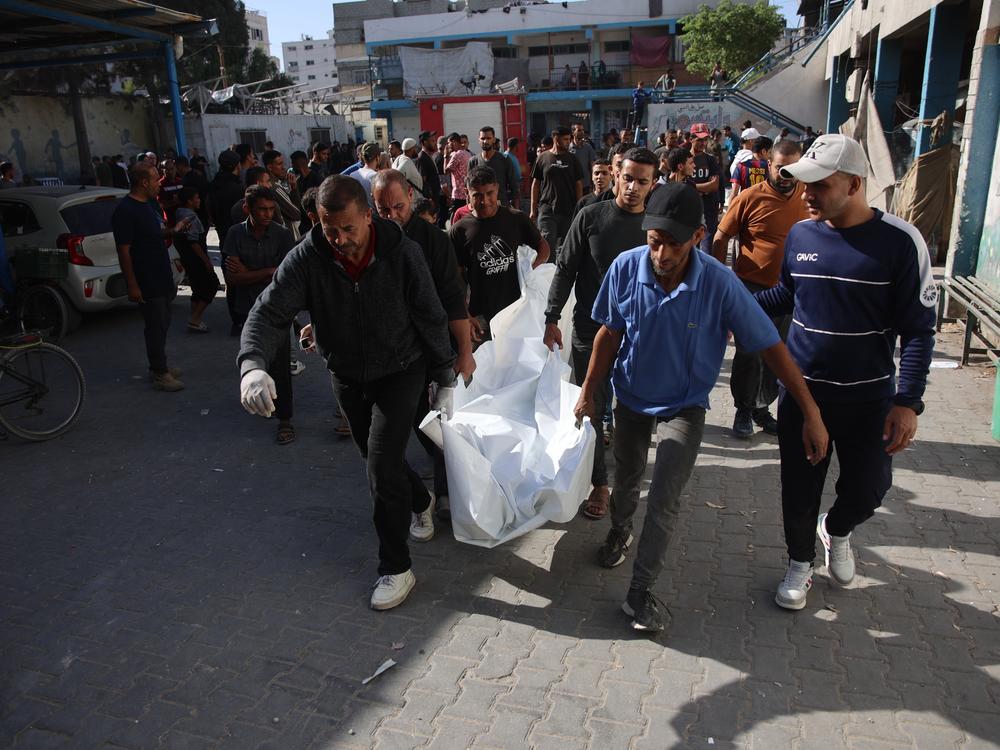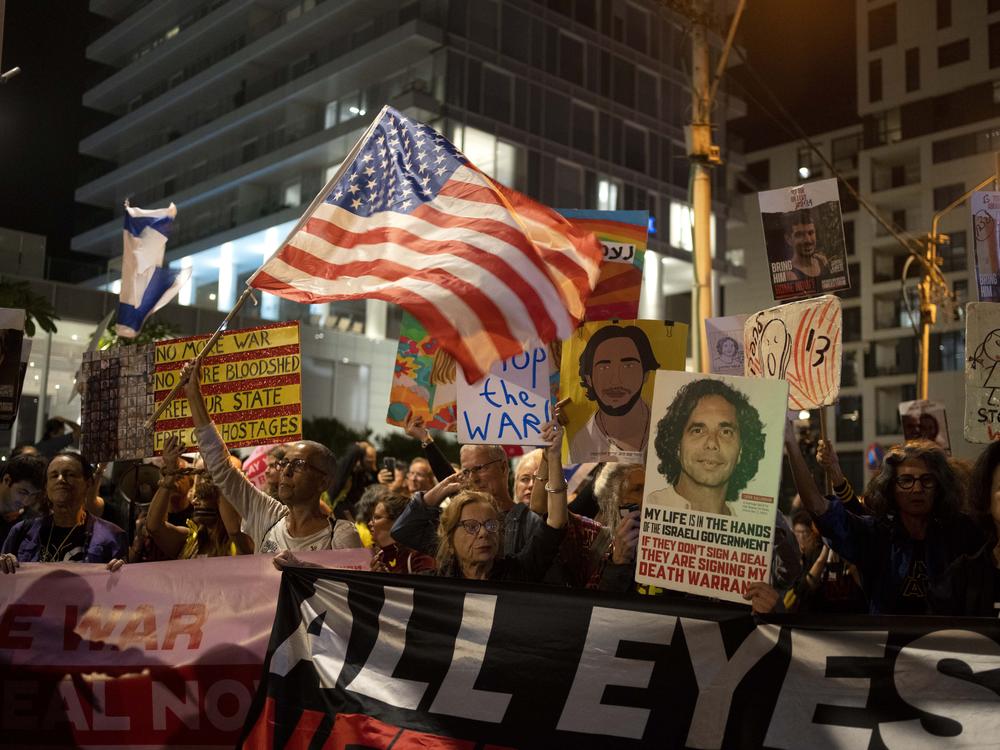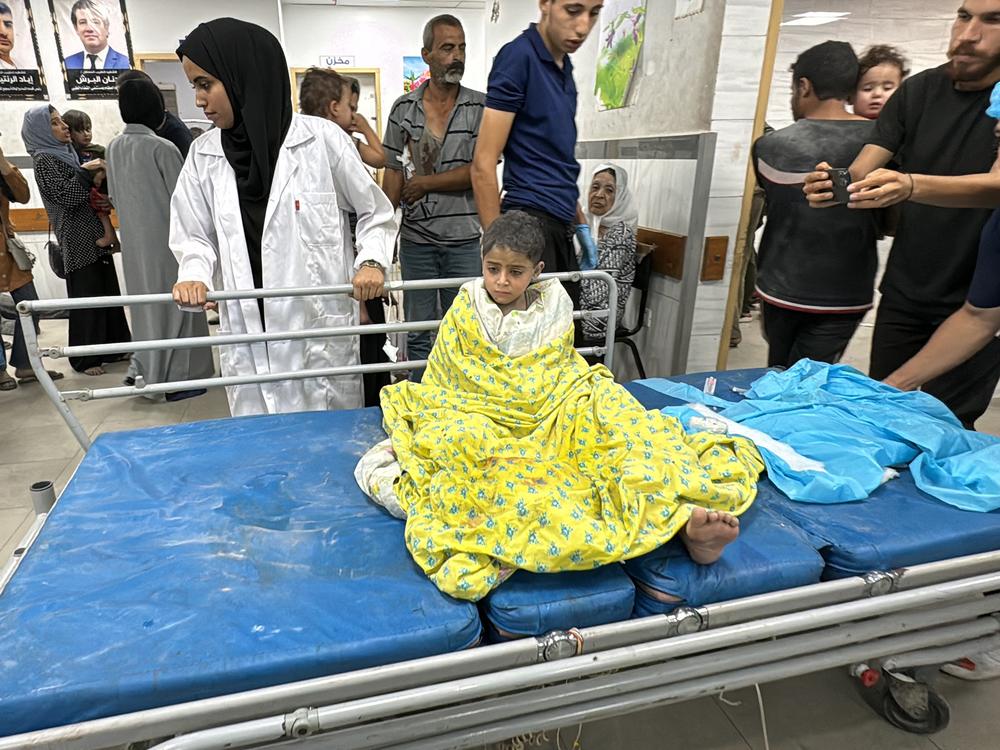Section Branding
Header Content
Israel awaits the U.S. election before a Gaza cease-fire, an official says
Primary Content
TEL AVIV, Israel — Israel is awaiting the results of the U.S. presidential election next week before moving forward on a new Egyptian cease-fire proposal for Israel and the Palestinian militant group Hamas in Gaza, according to an official briefed on the talks.
Egypt’s cease-fire proposal comes amid an intense Israeli siege and bombardment of north Gaza this past month.
Egyptian President Abdel Fattah el-Sisi laid out a proposal Sunday for an initial two-day cease-fire between Israel and Hamas — with the release of four hostages taken by Hamas in its Oct. 7, 2023, attack on Israel, in exchange for Israel releasing an unspecified number of Palestinian prisoners.
He called for more humanitarian aid to Gaza, saying the territory is on the brink of famine, and proposed 10 days of negotiations to try to reach a permanent cease-fire.
The Gaza war has lasted for more than a year. Israel’s bombardment of the territory has killed more than 43,000 Palestinians and wounded more than 101,000, according to Gaza’s Health Ministry. The war was sparked by the Hamas-led attack on southern Israel on Oct. 7, 2023, which killed around 1,200 people, and hundreds more Israeli civilians and forces have been killed in combat and in attacks since in the rapidly growing conflict, according to Israeli authorities.
Talks to end the war have continuously faltered, with the latest U.S.-led effort failing in August. The new push for an even shorter pause of Gaza hostilities comes just before the Nov. 5 U.S. presidential elections and after Israeli airstrikes Saturday on military facilities in Iran.
New cease-fire talks
CIA chief William Burns and Israel’s Mossad spy chief David Barnea met in Doha with the prime minister of Qatar over the weekend to discuss the renewed efforts.
The Israeli prime minister’s office said the senior officials discussed “a new unified framework that combines previous proposals and takes into account key issues and recent developments in the region.”
Israel said those talks would continue in the coming days between the mediators and with Hamas to examine the feasibility of talks and to further efforts to promote a deal.
No breakthrough is expected before U.S. election, the official briefed on the matter said.
Hamas declined comment. An official from an Arab country in the region said Israel had rejected the proposal and was buying time.
Both officials spoke on condition of anonymity to discuss the closed-door talks.
The Arab official said Egypt proposed an initial pause followed by the release of several Israeli hostages who also hold either U.S. or Russian citizenship. The next steps Egypt proposed to wind down the war would include an Israeli troop withdrawal from Gaza’s border crossing with Egypt, and the entry of Arab nations’ and international forces to run the crossing and facilitate the entry of more aid to Gaza.
The last phase in the Egyptian proposal would see an Israeli withdrawal from the entire length of the nearly 9-mile-long Gaza-Egypt border and the return of some displaced Palestinians to north Gaza after being screened at a checkpoint.
In a speech Sunday, Israeli Defense Minister Yoav Gallant said “painful compromises will be required” for the release of hostages in Gaza.
Egypt’s president says he has been advancing his cease-fire proposal in recent days.
Israel ends weekend raid of hospital in north Gaza
The ongoing Israeli assault in northern Gaza is one of the most intense bombardments there in more than a year of war.
The campaign has killed more than 800 people including women and children since the north Gaza siege began on Oct. 5, according to a Palestinian emergency responder group, and has driven tens of thousands of Palestinians from homes and shelters.
“The plight of Palestinian civilians trapped in North Gaza is unbearable,” said Stéphane Dujarric, spokesperson for United Nations Secretary-General António Guterres. “The Secretary-General is shocked by the harrowing levels of death, injury and destruction in the north, with civilians trapped under rubble, the sick and wounded going without life-saving health care, and families lacking food and shelter, amid reports of families being separated and many people detained.”
Israel’s military has besieged the Jabaliya area since Oct. 5, ordering all civilians to evacuate. Israel says it has been targeting shattered Hamas brigades trying to regroup.
Displaced residents say Israeli drones hovered over shelters and homes, broadcasting evacuation orders and opening fire on civilians as they fled.
An Israeli military official, speaking on condition of anonymity in order to discuss the military’s operations, told reporters approximately 20,000 civilians have left the Jabaliya area, leaving about 10,000 people remaining whom the military is urging to evacuate.
Mahmoud Basal, the spokesman of Gaza’s civil defense group, says some 830 bodies were brought to Kamal Adwan Hospital in Jabaliya, one of the last functioning hospitals in north Gaza, since the beginning of the siege. He said other bodies were in streets and under rubble but that first responders were unable to retrieve them in recent days due to the bombardment and attacks on their vehicles.
Over the weekend, Israeli troops raided the hospital, where civilians sheltered alongside patients and medical staff. Israel said militants were operating in the area.
Israeli troops detained more than 30 medical staff in the raid, leaving just two doctors to care for more than 145 patients, many of them children in critical condition due to Israeli airstrikes and shelling, the hospital director said in a television appearance on Al Jazeera. Videos before the raid on Kamal Adwan Hospital, the only hospital in northern Gaza with a pediatric wing, showed severely burnt children in its ICU ward and connected to life support machines.
The Israeli military official said more than 100 militants, some posing as medical staff, were detained and taken to Israel, before troops retreated from the hospital.
Israel’s military said it facilitated the relocation of some patients. The World Health Organization said it delivered fuel and blood supplies to the hospital before the raid.
Dr. Hussam Abu Safiya, the hospital’s director, said patients died because the hospital lacked basic supplies and medical staff.
Speaking through tears, the hospital director said on Al Jazeera that he buried his young teenage son, Ibrahim, on the hospital’s grounds over the weekend.
MedGlobal, a nonprofit humanitarian group whose staff has been working at the hospital, said Safiya’s son was killed by Israeli aircraft in Jabaliya.
Israeli military officials said the son had acted against military forces, without providing details.
Loading...
Aya Batrawy contributed to this report from Dubai, United Arab Emirates; Ahmad Abu Hamda contributed from Cairo; and Itay Stern from Tel Aviv.



